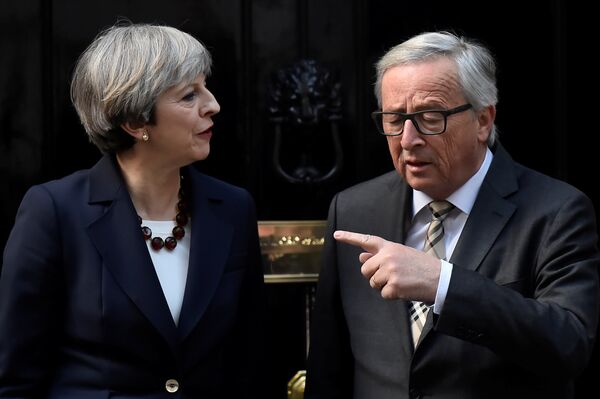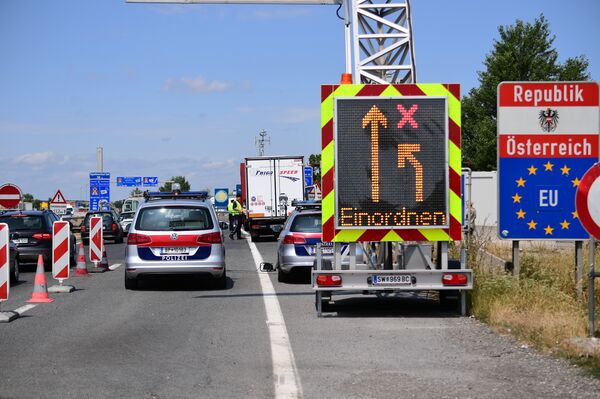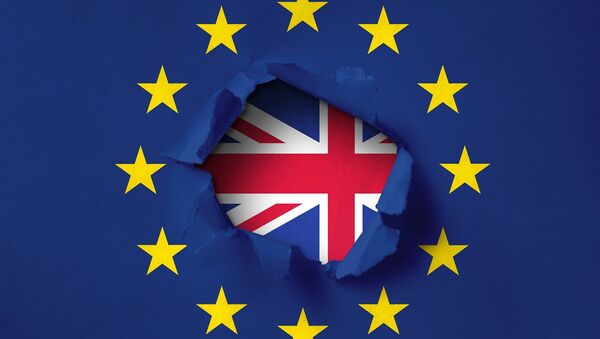The EU is facing a multitude of challenges, including Brexit and the accompanying €10 billion ($11.62 billion) annual loss of revenue. Iain Begg, a Professorial Research Fellow at the London School of Economics and Political Science's European Institute told Radio Sputnik that the EU is likely to "muddle through" these problems with compromises on the common agricultural policy and other expensive "big ticket" policies.
Sputnik: How important is it for the EU to receive the money it's requesting from the UK in its "Brexit divorce bill," and how much do you feel the EU would accept in order to let Brexit negotiations really start?
Iain Begg: The reason that the EU side is insisting on the divorce deal is that Britain is a net contributor to the EU budget, of the order of €10 billion per year. Take Britain out and somebody else has to make up that €10 billion or those who receive money will have to forgo €10 billion and that's why, certainly in the short-term, it's a particularly difficult issue for the negotiations.
To put it into perspective, the gross amount – not the net amount – paid by the UK is equivalent to the entire payments by the 13 member states that joined the EU since 2004, that's all of central-eastern Europe, Malta, Cyprus and so on. Therefore, it's a big hole. The countries which are usually classed among the net contributors, particularly the Germans, are extremely reluctant to pay more. The Swedish and Danish finance ministers have gone on record saying we're not paying a further cent when Britain leaves, therefore you'll have to reduce outgoings.

Sputnik: Do you perceive there's going to be a clash within the EU 27 in two or three years' time, in terms of trying to balance the budgets of all the member states? Is this going to confuse the EU's agenda moving forward, and for how long?
Iain Begg: It's going to be a multi-annual agreement, starting in 2021, without being precise because we're not sure whether it's going to be seven or five years this time round. Previously, it's been seven years. It's always been an extremely acrimonious contest as to who pays what and who receives what, and that contest is going to start building up in the course of 2018 and will reach its crescendo in 2019, approximately coinciding with the Brexit negotiation. So that's why it's all potentially such a time bomb in the system.
What tends to happen, is that the richer countries say "let's keep the EU budget small," because that's one way in which they can ensure that their contributions are capped, whereas the EU Parliament, the EU Commission, backed up by some of the smaller countries which receive [money] wants a bigger EU budget. These are incompatible positions, which is why it's always so awkward.
Specific EU programs such as mooted additional EU farm spending and regional aid programs have been targeted for cost-cutting. One option would be to ask national governments to part finance some farm subsidies. How reasonable do you believe this option is and what pressure will this bring to bear on EU member countries, especially the poorer ones?

The reason it's been kept over the years is because there's been a sufficient minority of countries keen to maintain it and in particular France, which has been a major net recipient from the CAP, has been unwilling to let it go. This time round, if you read Emmanuel Macron's Sorbonne speech, you'll see that he is now talking about reform of the agricultural policy. This is partly because the French gains from it are likely to decrease and France now sees itself in a position where it is losing from the CAP rather than gaining from it. That still leaves countries which are significant net recipients like Poland, Romania, even Ireland, as potential veto players in this, who will say, "It's all very well you saying we need to co-finance the CAP, but we will lose from it, we have a veto and we're going to wield that veto unless you give us a deal on something else."
That's the nature of these multifaceted negotiations and the likes of Poland will say, yes we are benefitting from substantial net inflow, but we're going to ensure that we continue to receive a net inflow because we're still well below the EU average prosperity. This is all done by late-night deals that don't necessarily reflect the budget, you might buy off the likes of Estonia by saying, "We'll give you military support." This is how the EU functions.
Sputnik: There's been a lot of talk about the EU and the challenges it has faced over the last two or three years. We've had the migration problem, refugees coming from the Middle East and African nations. We've had Brexit, the UK's potential divorce from the EU. We're currently seeing a continuing political event in Catalonia putting stress on the EU. What's your feeling with regard to the EU's future and its restructuring. Is the EU going to survive or is losing 12% of its budget a cataclysmic event that will finally fracture the bloc. What's your feeling?
Iain Begg: Well, to misquote Mark Twain, rumors of the EU's demise have been greatly exaggerated. I think that muddling through has been the long-run approach to many of these things from the EU and we will continue to see that.
I would not expect dramatic change in the EU budget. There will be some pressure to increase spending on the likes of border control, where too much of the burden falls on the countries which are on the frontier and not enough is paid by those countries which have no external frontiers other than their airports. You can think of Belgium or Austria, they don't have a direct border with the outside so they're spared having to do the customs checks. They might be expected to pay a bit more for that.

It will depend on what the EU decides to do for itself. There was a lot of speculation earlier in the year, prompted by the European Commission White Paper on the Future of Europe, with five scenarios ranging from more of less the status quo to a quantum leap toward closer integration. Jean-Claude Juncker in his State of the Union speech re-affirmed the desire to move to closer union, but Emmanuel Macron said in some ways the opposite. He said that only those countries that want to go ahead, should go ahead and that's going to raise new questions about the EU's finances outside the EU budget. Should you have a special budget for the Eurozone, for example, to deal with fluctuations in the economy, which the current EU budget cannot do. These are all things that are the table and will be around the budget negotiations, around the question of Brexit, about advances in the EU.

